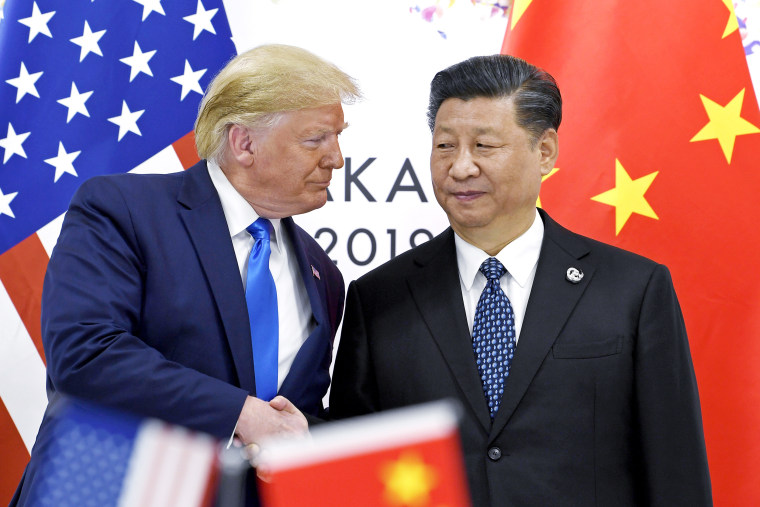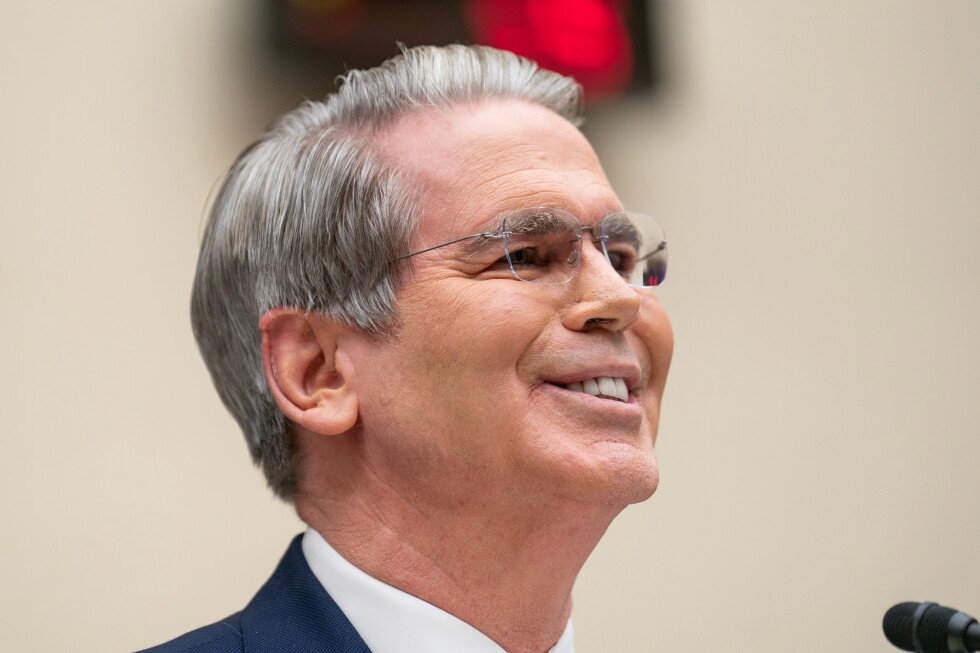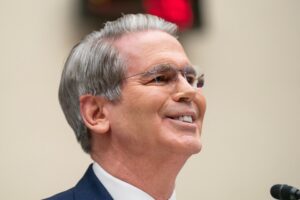The Dictatorship
Cheap labor isn’t the only advantage China has over the United States

The trade deficit with China in the current tariff war is overshadowing another important shortfall — our country’s education deficit with China.
As the Trump administration threatens American universities, guts crucial research programs, slashes education spending and threatens to kill the Department of Education, Chinese leaders are steaming ahead to improve their vast nation’s education standards and outcomes. And China is doing this with a laserlike focus on programs around science, technologyindustrial innovation and ai.
As the Trump administration slashes education spending, Chinese leaders are steaming ahead to improve their nation’s education standards and outcomes.
Meanwhile, the U.S. Secretary of Education Linda McMahon confused the abbreviation for artificial intelligence with A-1the popular steak sauce brand. The contrast could not be more stark, and the consequences should worry all of us.
China graduates almost twice as many STEM-oriented Ph.D.s in science and technology programs than the U.S. — an estimated 77,000 versus 40,000 according to the Center for Security and Emerging Technology. But those numbers don’t tell the whole story. If you exclude international students from that count, then China outpaces the U.S. 3 to 1.
Their advantage doesn’t end with science and technology Ph.D.s. China has also been forging ahead to create stronger undergraduate engineering programsand vocational engineering disciplines to create a massive workforce of factory and innovation, with workers that have mastered specialized hands-on technological, problem solving and math skills.
There is a 2015 video with Apple CEO Tim Cook that has been re-circulating recently that explains why China is so attractive to foreign manufacturers. Here’s the newsflash: It’s not just about cheap labor. In that interview with former Fortune executive editor Adam Lashinsky at the Fortune Global Forum, Cook spells out why China is so important to Apple’s global supply chain for computers, iPads, iPhones and other products. He says, “The popular conception is that companies come to China because of low labor costs…. but the truth is China stopped being the low labor cost country many years ago. That is not the reason to come to China from a supply point of view. The reason is because of the skill and the quantity of skill in one location and the type of skill it is.”
Cook said in that video that “the products we do require really advanced tooling and … the tooling skill is very deep here. In the U.S., you could have a meeting of tooling engineers … and I am not sure you could fill the room. In China, you could fill multiple football fields. It is that vocational expertise is very deep, very very deep here, and I give the education system a lot of credit for continuing to push on that even when others were de-emphasizing vocational.”
He said workers there demonstrate an “intersection of craftsman kind of skill and sophisticated robotics and sort of the computer science world, that intersection that is very rare to find anywhere.”
Trump defends his torrent of tariffs by promising that such economic saber rattling will bring American manufacturing roaring back. However, his team does not seem to have a plan to rebuild a new model of American manufacturing that is based on brains as much as brawn, as well as the ability to keep up with rapid technological and engineering changes that require precise skills and advanced training.
Whether companies are creating washing machines or weather instruments, the manufacturing models that have become so attractive in China (and also increasingly in places like Vietnam and Indonesia) are based on those advanced skills Cook was talking about. That requires prioritizing academics and investing more in education at all levels — pre-K, K-12, vocational programs and higher education. It also requires investing in the government research programs that partner with universities. But Elon Musk’s DOGE brigade is enthusiastically ravaging the agencies and departments that support such partnerships.
Trump has been all bark and no long-term strategy.
Trump has been all bark and no long-term strategy. What’s sad is that America could continue to be the greatest economic global powerhouse. The ingredients for success are here, but Trump and his team seem hell-bent in destroying the educational and research infrastructure that could insure growth and dominance in the economic sphere. It’s like attacking the fuse box with a blow torch and expecting that the lights and the oven and the computers will all keep running.
It just doesn’t make sense.
In truth, America’s struggles with education predate Trump. Tuition rates have soared to levels that are hard to justify, and almost impossible for most families to finance without steep sacrifice. American students lag behind their international counterparts in several disciplines. A 2019 study conducted by the National Center for Education Statistics found that American 8th graders ranked 16th in math and 14th in science. As the Asia Times put it, our kids “were outclassed by students from Singapore, Taiwan, Japan, Russia, South Korea, Canada, Dubai and several European countries.”
The Organization for Economic Cooperation and Development’s 2018 Program for International Student Assessment found China to rank first — and far ahead of the U.S. — in reading, math and science, but even if we eliminate China’s cherry-picked data, the Asia Times reported, “the US still ranks 34th in math and 15th in science.” It rightly calls that “an appalling result for a country with the world’s best universities.”
Even though China has sometimes presented an overly flattering portrait of its students’ academic achievements, the truth remains that the country has put muscle into building a world-class compulsory education program for young people at the lower rungs of the economic ladder. They’re no longer primarily plowing the best resources into educating the social elite class at the expense of everyone else.
Kishore Mahbubani, the Singapore-based scholar and author of several books on Asia, including “Has China Won?,” argues that the economic standoff between the U.S. and China will be won and lost in the heartland of both countries and that education is the thing that will make the biggest difference.

“At the end of the day, the outcome of the geopolitical contest between the US and China will not be determined by which society is doing a better job at taking care of its bottom 50 percent and by which society’s kids can read, write and count,” Mahbubani argued in the Asia Times.
When you poll voters about what matters to them, they always put education high on the list, but our spending and strategic priorities as a nation don’t reflect that. The education stories that break into the news cycle are more often about school shootings, book bans, restrictions on transgender athletes and debates over critical race theory.
Instead of building America’s world-class education system, President Trump spends his time picking fights with universities or threatening to withhold funding from schools that allegedly teach concepts like white privilege or have what he considers to be “illegal DEI programs.” We have an administration that acts like America’s educational infrastructure is more of a whipping post than a whopping piston of growth.
A country that wants to stay ahead of or even keep up with China doesn’t treat its advanced education system with this kind of disdain and scorn.
Michele Norris is a senior contributing editor for BLN and the author of “Our Hidden Conversations: What Americans Really Think About Race & Identity.”
The Dictatorship
Treasury Secretary Bessent’s testimony descends into shouting matches

WASHINGTON (AP) — A hearing about oversight of the U.S. financial system devolved into insults several times Wednesday as Treasury Secretary Scott Bessent clashed with Democratic lawmakers over fiscal policy, the business dealings of the Trump family and other issues.
Appearances by treasury secretaries on Capitol Hill are more typically known for staid exchanges over economic policy than for political theater, but Wednesday’s hearing of the House Financial Services Committee hearing featured several fiery exchanges between the Republican Cabinet member and Democrats, with Bessent even lobbing insults back to the lawmakers.
Bessent called Rep. Sylvia Garcia “confused” when she questioned how undocumented immigrants could affect housing affordability across the country, prompting the Texas Democrat to snap back, “Don’t be demeaning to me, alright?”
Bessent later mocked a question from Rep. Stephen Lynch, D-Mass., about shuttered investigations into cryptocurrency firms. Lynch expressed frustration with Bessent’s interruptions, saying, “Mister Chairman, the answers have to be responsive if we are going to have a serious hearing.”
Bessent replied, “Well, the questions have to be serious.”
After a back-and-forth over whether tariffs cause inflation or one-time price increases for consumers, California Democratic Rep. Maxine Waters asked committee leaders to intervene with Bessent: “Can someone shut him up?”
And in a fiery exchange with Rep. Gregory Meeks over the Abu Dhabi royal family’s investment into the Trump family’s World Liberty Financial cryptocurrency firm last year, the New York Democrat dropped an F-bomb as he shouted at Bessent: “Stop covering for the president! Stop being a flunky!”
The Treasury Department did not immediately respond to a request for comment on the fireworks.
Bessent’s performance was “not a role you typically see a treasury secretary play,” said Graham Steele, a former assistant secretary for financial institutions under Biden-era Treasury Secretary Janet Yellen. The department has traditionally “been removed from some of the day-to-day, hand-to-hand political combat,” Steele said in an interview.
He recalled his former boss having tense exchanges over climate change and policy issues with Republican lawmakers during committee hearings, but the exchanges were not personal, he said, noting treasury secretaries have to strike a “delicate balance” of working with the White House while safeguarding the “economic stature” of the country internationally.
In recent months, Bessent has ratcheted up his insults when it comes to Democratic leaders.
He has called California Gov. Gavin Newsom “economically illiterate,” compared him to the fictional serial killer Patrick Bateman, and called him “a brontosaurus with a brain the size of a walnut.” He has on several occasions called Massachusetts Sen. Elizabeth Warren an “American Peronist” after she told American financial institutions not to finance the Trump administration’s massive support package for Argentina.
Bessent’s combativeness is, in part, a sign of the times, said David Lublin, chair of the Department of Government at American University’s School of Public Affairs.
“President Trump has shown he likes belligerence and he likes nominees and others who defend him vociferously,” Lublin told The Associated Press.
“It’s hard to say that this is unusual for this political environment. What used to be the normal modicum of respect for Congress has frayed to the point of vanishing,” Lublin said.
What was unusual, in Lublin’s view, was for Bessent to reveal his thoughts on monetary policy — normally the purview of the Federal Reserve — and his insistence that Trump has the right to interfere with the decision-making of the central bank. “You have a cabinet secretary defending the president’s efforts to erode institutions,” Lublin said.
On Thursday, Bessent will get another opportunity to spar with lawmakers. He is scheduled to appear before the Senate Banking, Housing and Urban Affairs Committee on the same topic: the annual report by the Financial Stability Oversight Council, which Bessent leads.
The Dictatorship
DHS lawyer removed after telling judge ‘this job sucks’

WASHINGTON (AP) — A government lawyer who told a judge that her job “sucks” during a court hearing stemming from the Trump administration’s immigration enforcement surge in Minnesota has been removed from her Justice Department post, according to a person familiar with the matter.
Julie Le had been working for the Justice Department on a detail, but the U.S. attorney in Minnesota ended her assignment after her comments in court on Tuesday, the person said. The person spoke on the condition of anonymity to discuss a personnel matter. She had been working for U.S. Immigration and Customs Enforcement before the temporary assignment.
At a hearing Tuesday in St. Paul, Minnesota, for several immigration cases, Le told U.S. District Judge Jerry Blackwell that she wishes he could hold her in contempt of court “so that I can have a full 24 hours of sleep.”
“What do you want me to do? The system sucks. This job sucks. And I am trying every breath that I have so that I can get you what you need,” Le said, according to a transcript.
Le’s extraordinary remarks reflect the intense strain that has been placed on the federal court system since President Donald Trump returned to the White House a year ago with a promise to carry out mass deportations. ICE officials have said the surge in Minnesota has become its largest-ever immigration operation since ramping up in early January.
Several prosecutors have left the U.S. Attorney’s office in Minnesota amid frustration with the immigration enforcement surge and the Justice Department’s response to fatal shootings of two civilians by federal agents. Le was assigned at least 88 cases in less than a month, according to online court records.
Blackwell told Le that the volume of cases isn’t an excuse for disregarding court orders. He expressed concern that people arrested in immigration enforcement operations are routinely jailed for days after judges have ordered their release from custody.
“And I hear the concerns about all the energy that this is causing the DOJ to expend, but, with respect, some of it is of your own making by not complying with orders,” the judge told Le.
Le said she was working for the Department of Homeland Security as an ICE attorney in immigration court before she “stupidly” volunteered to work the detail in Minnesota. Le told the judge that she wasn’t properly trained for the assignment. She said she wanted to resign from the job but couldn’t get a replacement.
“Fixing a system, a broken system, I don’t have a magic button to do it. I don’t have the power or the voice to do it,” she said.
Homeland Security Assistant Secretary Tricia McLaughlin said Le was a probationary attorney.
“This conduct is unprofessional and unbecoming of an ICE attorney in abandoning her obligation to act with commitment, dedication, and zeal to the interests of the United States Government,” McLaughlin said in a statement.
Le and the U.S. Attorney’s office in Minnesota didn’t immediately respond to emails seeking comment.
Kira Kelley, an attorney who represented two petitioners at the hearing, said the flood of immigration petitions is necessary because “so many people being detained without any semblance of a lawful basis.”
“And there’s no indication here that any new systems or bolded e-mails or any instructions to ICE are going to fix any of this,” she added.
The Dictatorship
‘Monster’s Paradise’ lampooning Trump has world premiere at Hamburg Opera

HAMBURG, Germany (AP) — Tobias Kratzer spoke in disbelief ahead of the world premiere of “Monster’s Paradise” by Olga Neuwirth and Elfriede Jelinek, which features a gluttonous, ravenous, insatiable President-King, lampooning U.S. President Donald Trump.
“The metaphor has become a reality,” the Hamburg State Opera artistic director said in his office Sunday morning. “I’m really hoping in — what is it, eight hours? — the piece is not completely outdated because up until now it has always gone closer and closer to not being a satire but being reality.”
Jelinek, 79 and winner of the 2004 Nobel Prize in Literature, collaborated with Neuwirth for the first time in two decades, the Austrian duo combining on a German-language libretto. The 57-year-old Neuwirth won the 2022 Grawemeyer Award for Music Composition, three years after she became the first woman composer with a work presented at the Vienna State Opera.
Chorus members dressed as zombies and roamed the foyers before the opera and during the intermission, along with Disney-styled princesses and dancing hot dogs. The opera began with a Las Vegas-style LED sign and action on a passerelle.
A 19th-century satire was the starting point
Alfred Jarry’s 1896 play “Ubu Roi” was the inspiration, a profane, scatological work that had a one-performance run in Paris, cut short by an angry audience response.
Aspects of Jarry’s King Wenceslas and Ubu characters were adapted into The President-King for what Neuwirth and Jelinek call a Grand Guignol opera, which has a six-performance run through Feb. 19. It moves to the Zurich Opera from March 8 to April 12 and next season to Austria’s Oper Graz. An audio recording is planned.
The President-King entered in a gilded Oval Office with a Coca-Cola filled refrigerator. A golden crown sat on his desk along with a red button that jettisoned visitors such as an Elvis Presley impersonator in the manner of a TV game show as a trio of red X-shaped lights flashed. A woman resembling Melania Trump lurked in the background.
“I have long known Jarry’s play, but when Trump came to power, I instantly thought of it,” Jelinek said in an emailed response to questions translated from German.
Vampi and Bampi, a pair of pun-prone vampires sung by Sarah Defrise and Kristina Stanek, are avatars of the authors during five scenes that unfold over 2 hours, 45 minutes, and they frame action in the manner of Wagner’s Rheinmaidens and Norns. The President-King (sung by Georg Nigl) is opposed by Gorgonzilla (Anna Clementi), a monster spawned by a nuclear accident. One of the early titles was “Godzilla,” but it was changed because of a rights issue.
Mickey and Tuckey, the President-King’s adjutants sung by countertenors Andrew Watts and Eric Jurenas, were patterned after Elon Musk and Mark Zuckerberg, according to Kratzer, who directed the production. They sing lines such as: “Nobody has such high numbers as you.”
Charlotte Rampling, in several projected videos, portrays a character called The Goddess who defends nature and civilization. Gorgonzilla devours the The President-King, but the creature also becomes an authoritarian. The opera ends with video of the vampires drifting on a platform along the Elbe while playing Schubert on a Bösendorfer piano, worrying the Earth has been destroyed by its leaders.
Outlandish portrayal of Trump-like character
The President-King grows to huge dimensions while wearing a diaper and golden necktie in Rainer Sellmaier’s set and costume design, and he plants a golf club on Gorgonzilla’s rock, much like the White House AI photo of Trump landing on Greenland. The President-King boasts of winning “Ohoho” and “Tuxus,” and his lead in “Pennsilfania” isn’t even close.
Wearing Kermit the Frog and Miss Piggy masks, the vampires attack The President-King with sledgehammers and saws, which have no impact. The one resembling Miss Piggy mimics missing with a rifle, prompting The President-King to raise a fist in defiance.
“People of power are always afraid of humor,” Neuwirth said. “For example, Hitler was so afraid of Charlie Chaplin’s `The (Great) Dictator’ — he watched it secretly in his room in Berlin — because they are afraid to be laughed at. They have this ego, which is not allowed to be questioned.”
Neuwirth composed for a Mozart-sized orchestra adding an electric guitar and a drum kit, as characters often used Sprechstimme — spoken-word singing. Conductor Titus Engle melded Neuwirth’s many musical genres.
“I’m not playing the American president, but it’s very close,” Nigl said. “I am playing a misogynist. I am playing a braggart. I am playing a fraudster, a despiser.”
Nigl portrayed Russian President Vladimir Putin last year in Gordon Kampe’s “Die Kreide im Mund des Wolfs (The Chalk in the Wolf’s Mouth).” Nigl said his most important words in this opera are when he sings: “He who has millions does not need voters.”
Trump’s reaction is on their minds
Neuwirth vowed “I’m never going to write an opera again,” adding she will reveal her reason at a later date.
She is aware she could face repercussions from the U.S. administration.
“I’m kind of a little bit afraid because I want to still enter the United States,” she said.
Jelinek remained unconcerned.
“I am not afraid. I am a small, unimportant European woman,” she wrote in her emailed responses.
-

 The Dictatorship12 months ago
The Dictatorship12 months agoLuigi Mangione acknowledges public support in first official statement since arrest
-

 The Dictatorship5 months ago
The Dictatorship5 months agoMike Johnson sums up the GOP’s arrogant position on military occupation with two words
-

 Politics12 months ago
Politics12 months agoFormer ‘Squad’ members launching ‘Bowman and Bush’ YouTube show
-

 Politics12 months ago
Politics12 months agoBlue Light News’s Editorial Director Ryan Hutchins speaks at Blue Light News’s 2025 Governors Summit
-

 The Dictatorship12 months ago
The Dictatorship12 months agoPete Hegseth’s tenure at the Pentagon goes from bad to worse
-

 Politics12 months ago
Politics12 months agoFormer Kentucky AG Daniel Cameron launches Senate bid
-
Uncategorized1 year ago
Bob Good to step down as Freedom Caucus chair this week
-

 Politics10 months ago
Politics10 months agoDemocrat challenging Joni Ernst: I want to ‘tear down’ party, ‘build it back up’







